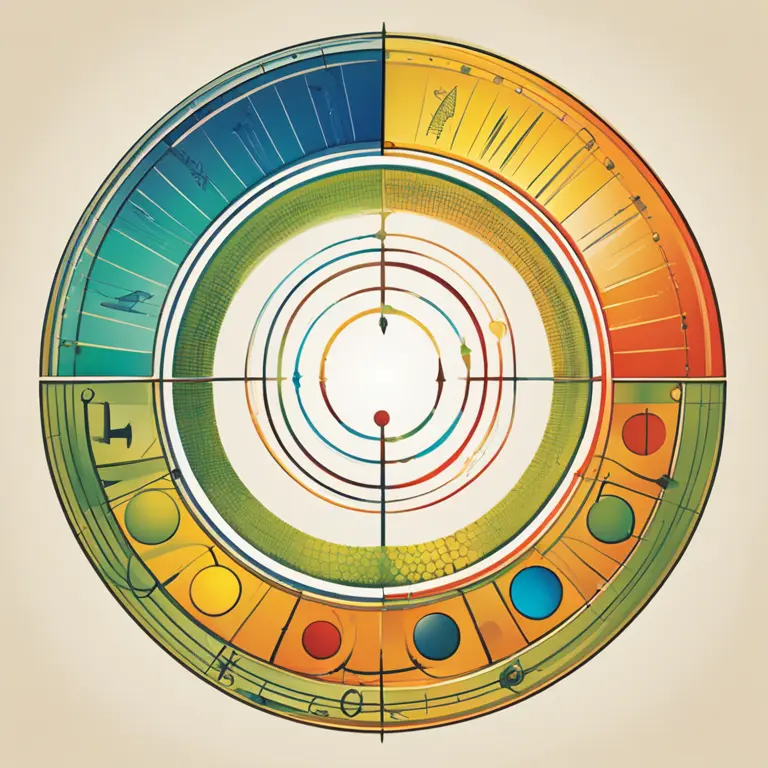
The Rhythms of Life: Delving into Human Biorhythms
Discover the fascinating world of human biorhythms and how they influence our daily lives, health, and well-being.
article by Adrian Wallace
What Are Human Biorhythms?
In the realm of holistic wellness, human biorhythms represent an intriguing concept that posits our life is influenced by natural, rhythmic biological cycles. These biorhythms are said to regulate various aspects of our physical, emotional, and intellectual well-being. The theory, which emerged in the early 20th century, suggests that understanding these cycles can help us harmonize with our body's natural energies and enhance our daily performance. Skeptics, however, question the scientific validity of biorhythms, encouraging further research and exploration into this fascinating field.

Cycles of Biorhythms
The primary biorhythms encompass three cycles: a 23-day physical cycle, a 28-day emotional cycle, and a 33-day intellectual cycle. Each of these reflects the highs and lows in specific areas of life. For example, when your physical cycle is at a peak, you might feel full of vigor and robustness, whereas during a low, you might experience fatigue or decreased stamina. Likewise, the emotional and intellectual cycles influence your feelings and cognitive abilities respectively, oscillating between periods of heightened capability and phases of diminished function.

Modern Biorhythm Tracking
With the advent of wearable technology and health tracking apps in 2024, monitoring biorhythms has never been more accessible. These tools offer personalized data that can predict the interplay of different cycles, allowing individuals to plan activities to coincide with their high-performance phases, or take it easy during the lows. The integration of AI and advanced algorithms has improved the predictive accuracy of these tools, thus providing more nuanced insights into one’s physiological and psychological rhythms.

The Impact of Biorhythms
Taking biorhythms into account can have a profound impact on various life aspects. In the professional sphere, workers may schedule tasks demanding high concentration or physical effort around their peak intellectual and physical cycles. In personal health, understanding biorhythms might influence sleep patterns, exercise routines, and diet. Emotional wellness also gains attention, with people increasingly acknowledging the benefits of aligning important decisions with favorable emotional cycles to improve interpersonal relationships and emotional health.

The Scientific Debate
Biorhythms have sparked debate within the scientific community. Critics argue that there is a lack of empirical evidence supporting the correlation between these cycles and life events. In contrast, proponents defend the anecdotal evidence and subjective experiences of individuals who track their biorhythms and report improvements in their lives. As of 2024, the scientific community continues to explore the validity of biorhythms, meaning that while they're embraced in alternative health circles, mainstream acceptance remains elusive.
Implementing Biorhythm Knowledge
For those intrigued by human biorhythms, start by noting how your mood, energy, and thoughts fluctuate over time to discover any patterns. A plethora of digital platforms are now available that can calculate and track your personal biorhythms. Whether or not you fully subscribe to the theory of biorhythms, being mindful of your body’s natural ebbs and flows is universally recognized as beneficial for maintaining a balanced lifestyle. Moreover, tuning into the body’s innate wisdom fosters a deeper connection with oneself and nurtures overall well-being.
Published: 1/30/2024
Modified: 1/30/2024
More predictions
Come back here soon to learn more about yourself and your future


The Rhythms Within: An Insight into Biorhythms
Discover the science and philosophy behind biorhythms, the cyclical patterns our bodies follow, in connection with our physical, emotional, and intellectual states.


The Rhythms Concept: A Guide to Biorhythms
Discover the intriguing concept of biorhythms: the cyclic patterns influencing our physical, emotional, and intellectual states.


Unlocking The Biorhythms Guide
Delve into the fascinating world of biorhythms to learn how they influence your physical, emotional, and intellectual states, potentially shaping your daily life and decisions.